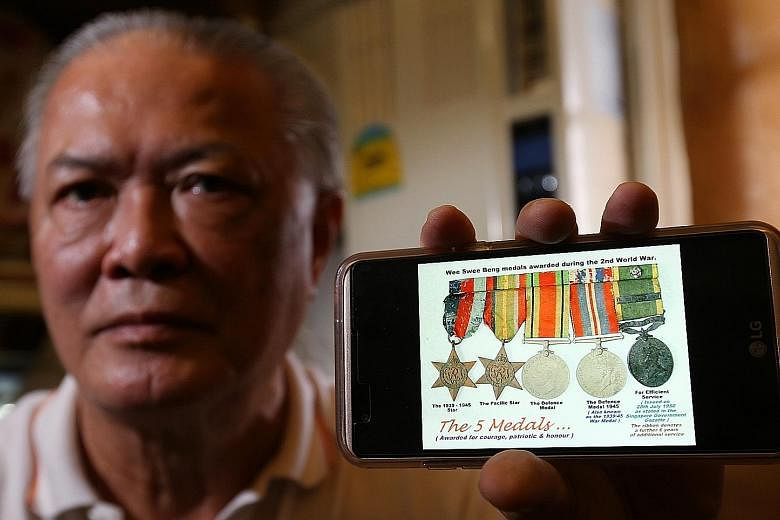Private Wee Swee Beng served in the Straits Settlements Volunteer Force (SSVF) and fought with the British during World War II.
He won five medals for his service in the war - which is considered an exceptional feat.
His son, Mr Tony Wee, would love to find out what his father had done to earn the medals. But he was only 13 when his father died in 1963 at age 52. "He never spoke about the war, nor did he display his medals, which he kept inside a cabinet," Mr Tony Wee, now 69 and retired, told The Sunday Times in an interview at his Bukit Batok flat.
He remembers seeing the shiny medals resting in a yellow tin box that had an "official-looking" crest on it when he was 10 years old. There was also a piece of paper inside with a description of the medals, said Mr Wee, the fourth son in a family with six boys and a girl.
It was more than 40 years later that Mr Wee, a former director of an outdoor advertising firm, saw the medals again at his eldest brother's home in 2009.
"The beautiful box and paper were gone," he said. The medals had lost their lustre and the ribbons were discoloured.
"The medals should have been preserved as they were my dad's legacy," he added.
The medals - the 1939-1945 Star, the Pacific Star, the Defence Medal, the War Medal 1939-1945 and the Efficient Service Medal - are now kept by Mr Wee's sister-in-law in Ipoh, Perak.
In 2013, Mr Wee wrote to the National Heritage Board to try to find out more about his father after viewing a World War II exhibition at the National Museum.
He was told in an e-mail that the Efficient Service Medal was issued to his father on July 28, 1950, for 12 years of continuous service in the volunteer forces.
The e-mail confirmed that his father had served in the SSVF. "I was glad that the medals were not fakes that I thought my father had bought from Sungei Road," Mr Wee said.
Winning five medals is a rare achievement, said naval veteran Adrian Villanueva, 77, considering that getting one medal is already not easy. But exceptions were made during the war, said Mr Villanueva, who lectures at the Goh Keng Swee Command and Staff College at Safti Military Institute.

His father, Mr Francisco Villanueva, who had not served in a combat role, was awarded the Defence Medal as a volunteer air-raid warden for hiding documents that would have exposed the identities of other volunteers fighting against the Japanese.
Mr Adrian Villanueva noted that some highly decorated volunteers had served in the Malayan Royal Naval Volunteer Reserve and fought in the Battle of the Atlantic, waged between the Western Allies and the Axis powers during WWII for the control of Atlantic sea routes. Others were guerilla fighters from the anti-Japanese Dalforce resistance group formed in January 1942 and deployed in the Battle of Singapore.
"Campaign medals are important as they recognise a person's participation in hostilities and honour the sacrifice made to the service and country," said Mr Villanueva.
-
The medals
-
The 1939-45 Star
Awarded for service in operations from Sept 3, 1939, to Sept 2, 1945. Its ribbon has three vertical stripes of dark blue, red and light blue, denoting
the naval forces and merchant navy, the armies, and the air forces, respectively. -
The Pacific Star
Awarded for entry into operational service in the Pacific Theatre between Dec 8, 1941, and Sept 2, 1945. Its ribbon is dark green with red edges and a central yellow stripe. There are two other narrow stripes - dark blue and light blue. The green and the yellow stand for the forests and the beaches of the Pacific, while the other colours represent the various services.
-
The Defence Medal
Awarded to those who served for six months in non-operational areas subjected to enemy attacks. Its ribbon has a centre "flame" with green edges, symbolising enemy attacks. Blackouts are marked by two thin black stripes down the centre of the green edges.
-
The War Medal 1939-1945
Awarded to personnel of the armed forces wherever their service during the war had been rendered. There is a 28-day qualification period. The ribbon is red, white and blue. There is a narrow central red stripe, flanked on both sides by a narrow white stripe.
-
The Efficient Service Medal
Awarded to personnel after 12 years of service. A bar is issued for every six years of service. The place of service is inscribed - for example, "Malaya".
Mr Wee does not really know how his father earned the other four medals, besides the Efficient Service Medal. Not many things were left from his father's war service days.
The SSVF personnel were taken by surprise by the invading Japanese troops, which entered from the north-western part of Singapore - and not the south as expected - on Feb 8, 1942. The British surrendered Singapore to the Japanese a week later on Feb 15, 1942.
"By the time the Japanese were on Singapore's doorstep, my father was ordered to destroy 'evidence'," Mr Wee said, relating what an aunt had told him about his father, who was said to have been recalled from Malaya to defend the Kallang area.
"He threw his uniform and other things (relating to the British) into a well in our home in Thomson Road."
The late Mr Wee appeared to have had good connections - he was said to have looked after 50 relatives during WWII, Mr Tony Wee heard from relatives. The family went unharmed during the war and "did not know what it was like to go hungry".
Mr Wee said his father was a stern man. "My older cousins told me that whenever they heard or saw my father returning home from work, they would all hide under the bed. But I was not afraid of him."
Instead, he has fond memories of going by car to Johor and the Turf Club with his father, who liked to bet big on horses and English football.
After the war, Mr Wee's father found himself working with the British again. But this time, he was importing British canned food.

"During Chinese New Year, my father would bring home big baskets containing canned food," Mr Wee recalled. "He would distribute them to relatives and neighbours to spread the cheer."
This stopped following his father's death in 1963. His Morris Ten car was sold for $50 to a plantation owner. Six years later, Mr Wee's mother, a Peranakan, died as well.
Today, Mr Wee, whose three older brothers have already died, is working with a sense of urgency to preserve his family's history.
Sitting in his study, whose walls are decorated with family photographs, he uploads images of family activities into a hard drive containing old photos of his parents and siblings and montages of his father's medals. He also copies the data to three other hard drives - one each for his remaining siblings' families.
He said: "I have my regrets. But my children and grandchildren do not need to go through the same regret of not knowing the generations before them."


